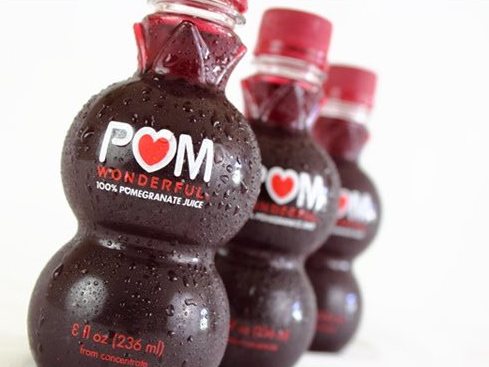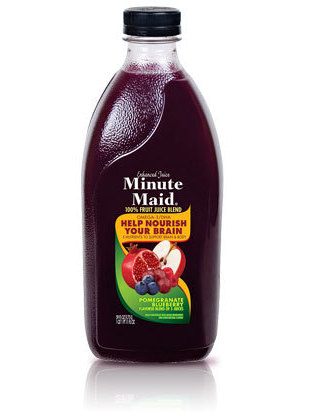Listen to the Story on All Things Considered
POM Wonderful Wins A Round In Food Fight With Coca-Cola
POM Wonderful Wins A Round In Food Fight With Coca-Cola
by Nina Totenberg, The Salt at NPR Food (6/12/14)

A food fight at the U.S. Supreme Court ended in a unanimous decision on Thursday.
The justices ruled that POM Wonderful can go forward with a lawsuit alleging Coca-Cola Co. tricked consumers and stole business from POM with false and misleading juice labels.
The case centers on a product aimed at health-conscious consumers: pomegranate-blueberry juice.
One version is made by POM Wonderful, a grower of pomegranates; the other, produced by Coca-Cola's Minute Maid division, says in large print that it is pomegranate-blueberry juice, too. The Coca-Cola product is almost five times cheaper. Only if you read down to the small print on the label do you see why: While POM's juice is 85 percent pomegranate and 15 percent blueberry juice, the Coca-Cola product is just 0.5 percent pomegranate and blueberry juice — combined.
POM sued Coca-Cola, claiming that it was losing sales because Coca-Cola's label and advertising were misleading consumers into believing they were getting a juice combination consisting mainly of pomegranate and blueberry juices when, in fact, the juice was more than 99 percent apple and grape juices, which are far cheaper. POM asked for damages and a court order barring such labeling.
Two lower courts ruled against POM, agreeing with Coca-Cola that because its label complies with the requirements of the Federal Food, Drug and Cosmetic Act, it is immune to suits under another law, called the Lanham Act.

On Thursday, however, the Supreme Court disagreed with Coca-Cola, giving the green light for POM's lawsuit to go forward. Summarizing the decision from the bench, Justice Anthony Kennedy said that "the position Coca-Cola takes in this court" is that because it complied with the Food and Drug Act's labeling requirements, it could "mislead and trick consumers" without being subject to liability.
That assertion, he said, is "incorrect." The Lanham Act and the Food and Drug Act are supposed to work together: The former allows competitors to bring civil lawsuits to protect their commercial interests from unfair competition, while the latter protects public health and safety. To the extent that they both cover labels, Justice Kennedy said, FDA regulations are not a ceiling that insulates companies from being sued by competitors.
Rather, the Lanham Act is the yin to the FDA's yang, because it should "provide incentives for manufacturers to behave well."
POM Wonderful co-owner Lynda Resnick gave the credit for the victory to her husband, Stewart, who, she noted, has insisted on pursuing this case for more than five years, all the way to the Supreme Court.
"He is kind of a 21st century John Wayne," said Resnick, and "very much wants what's right for the food industry and for the American consumer."
Just how broad the repercussions will be for the food and beverage industry is unclear. After all, Thursday's Supreme Court decision allows competitors, but not consumers, to bring suits like the one at issue in the Supreme Court ruling.
"I don't know whether it will change the landscape of labeling," said associate professor Diana R.H. Winters, of Indiana University law school. "I think food companies will have to look more closely at their labeling now."
The POM Wonderful suit will now proceed to trial, if it is not settled. It will be a jury that decides whether Coca-Cola did anything wrong and, if so, how much the company should pay POM in damages.
POM Wonderful is on the defensive in another suit that's slowly wending its way to the Supreme Court.
The Federal Trade Commission accused the company of its own deceptive advertising. The FTC ordered POM to stop advertising health benefits for its juice until it can prove those benefits with clinical trials involving human subjects. POM challenged the FTC order, lost in federal District Court and is appealing.
Copyright 2014 NPR.
